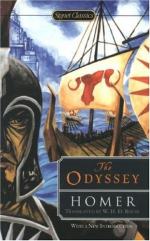“O royal mother! ever-honour’d name!
Permit me (cries Telemachus) to claim
A son’s just right. No Grecian prince but
I
Has power this bow to grant or to deny.
Of all that Ithaca’s rough hills contain,
And all wide Elis’ courser-breeding plain,
To me alone my father’s arms descend;
And mine alone they are, to give or lend.
Retire, O queen! thy household task resume,
Tend, with thy maids, the labours of thy loom;
The bow, the darts, and arms of chivalry,
These cares to man belong, and most to me.”
Mature beyond his years, the queen admired
His sage reply, and with her train retired;
There in her chamber as she sate apart,
Revolved his words, and placed them in her heart.
On her Ulysses then she fix’d her soul;
Down her fair cheek the tears abundant roll,
Till gentle Pallas, piteous of her cries,
In slumber closed her silver-streaming eyes.
Now through the press the bow Eumaeus bore,
And all was riot, noise, and wild uproar.
“Hold! lawless rustic! whither wilt thou go?
To whom, insensate, dost thou bear the bow?
Exiled for this to some sequester’d den,
Far from the sweet society of men,
To thy own dogs a prey thou shalt be made;
If Heaven and Phoebus lend the suitors aid.”
Thus they. Aghast he laid the weapon down,
But bold Telemachus thus urged him on:
“Proceed, false slave, and slight their empty
words:
What! hopes the fool to please so many lords?
Young as I am, thy prince’s vengeful hand
Stretch’d forth in wrath shall drive thee from
the land.
Oh! could the vigour of this arm as well
The oppressive suitors from my walls expel!
Then what a shoal of lawless men should go
To fill with tumult the dark courts below!”
The suitors with a scornful smile survey
The youth, indulging in the genial day.
Eumaeus, thus encouraged, hastes to bring
The strifeful bow and gives it to the king.
Old Euryclea calling them aside,
“Hear what Telemachus enjoins (he cried):
At every portal let some matron wait,
And each lock fast the well-compacted gate;
And if unusual sounds invade their ear,
If arms, or shouts, or dying groans they hear,
Let none to call or issue forth presume,
But close attend the labours of the loom.”
Her prompt obedience on his order waits;
Closed in an instant were the palace gates.
In the same moment forth Philaetius flies,
Secures the court, and with a cable ties
The utmost gate (the cable strongly wrought
Of Byblos’ reed, a ship from Egypt brought);
Then unperceived and silent at the board
His seat he takes, his eyes upon his lord.
And now his well-known bow the master bore,
Turn’d on all sides, and view’d it o’er
and o’er;
Lest time or worms had done the weapon wrong,
Its owner absent, and untried so long.
While some deriding—“How he turns
the bow!
Some other like it sure the man must know,
Or else would copy; or in bows he deals;
Perhaps he makes them, or perhaps he steals.”
“Heaven to this wretch (another cried) be kind!
And bless, in all to which he stands inclined.
With such good fortune as he now shall find.”




